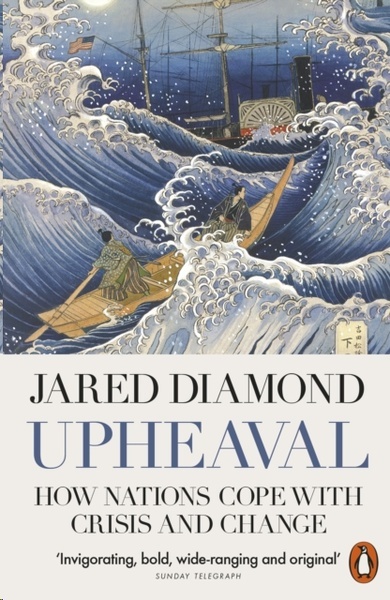Upheaval
How Nations Cope with Crisis and Change

Editorial Penguin Books Ltd
Fecha de edición mayo 2020 · Edición nº 1
Idioma inglés
EAN 9780141977782
512 páginas
Libro
encuadernado en tapa blanda
Resumen del libro
In his landmark international bestsellers Guns, Germs and Steel and Collapse, Jared Diamond transformed our understanding of what makes civilizations rise and fall. Now in the third book in this monumental trilogy, he reveals how successful nations recover from crisis. Diamond shows us how seven countries have survived defining upheavals in the recent past - from the forced opening up of Japan and the Soviet invasion of Finland to the Pinochet regime in Chile - through selective change, a process of painful self-appraisal and adaptation more commonly associated with personal trauma.
Looking ahead to the future, he investigates whether the United States, and the world, are squandering their natural advantages and are on a devastating path towards catastrophe. Is this fate inevitable? Or can we still learn from the lessons of the past? Exhibiting the awe-inspiring grasp of history, geography, economics and anthropology that marks all Diamond's work, Upheaval reveals how both nations and individuals can become more resilient. The result is a book epic in scope, but also his most personal yet.
Biografía del autor
x{0026}lt;P x{0026}lt;B Jared Diamondx{0026}lt;/B (1937) es catedrático de geografía en la Universidad de California (UCLA). Comenzó su actividad científica en el campo de la fisiología evolutiva y la biogeografía. Ha sido elegido miembro de la Academia de Artes y Ciencias, de la Academia Nacional de Ciencias y de la Sociedad Filosófica de Estados Unidos, y ha recibido una beca de investigación de la Fundación MacArthur, además de los premios Burr de la Sociedad Geográfica Nacional y Pulitzer de 1998 por x{0026}lt;I Armas, gérmenes y acerox{0026}lt;/I (1997).x{0026}lt;/P x{0026}lt;P Ha publicado más de seiscientos artículos en las revistas x{0026}lt;I Discoverx{0026}lt;/I , x{0026}lt;I Natural Historyx{0026}lt;/I , x{0026}lt;I Nature y Geox{0026}lt;/I . También es autor de x{0026}lt;I El tercer chimpancéx{0026}lt;/I (1994), x{0026}lt;I ¿Por qué es divertido el sexo?x{0026}lt;/I (1999), x{0026}lt;I Colapso x{0026}lt;/I (2006), x{0026}lt;I El mundo hasta ayerx{0026}lt;/I (2013) y x{0026}lt;I Sociedades comparadasx{0026}lt;/I (Debate, 2016) grandes éxitos que han obtenido, además, numerosos galardones.x{0026}lt;/P








